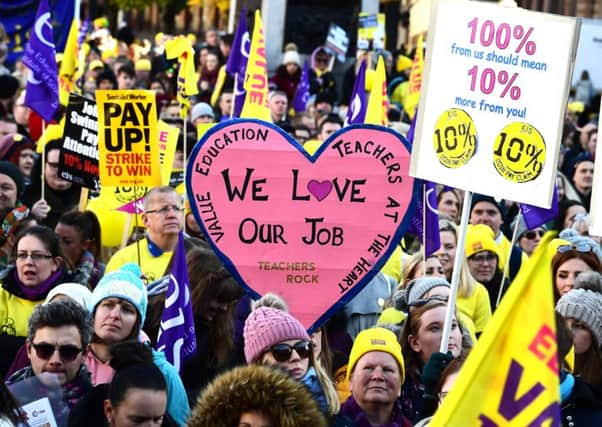Teachers urged to reject ‘fair’ 9 per cent pay offer


Councillors offered a revised deal of a 9 per cent increase between April 2018 and April 2019, with a further 3 per cent next year.
But following a meeting yesterday,the Educational Institute of Scotland (EIS) council announced it had voted “narrowly” to recommend turning down the offer.
Advertisement
Hide AdAdvertisement
Hide AdTeaching unions have been campaigning for a 10 per cent one-year deal.
The EIS will now ballot its members, but is recommending they vote against it.
Teachers have held rallies across Scotland in protests over pay, with more than 30,000 members of the profession attending a protest in Glasgow in October.
Last night Deputy First Minister and education secretary John Swinney said the pay offer was fair and warned “industrial action is not in anyone’s interest”.
The council also agreed the ballot communication would reflect the range of opinions expressed, including arguments both for and against the offer to allow members to make an informed decision.
EIS general secretary Larry Flanagan said the final decision rested with teachers.
“Following today’s decision at council, it will now be for our members to decide on whether to accept or reject this revised offer,” he said.
Advertisement
Hide AdAdvertisement
Hide AdScotland’s council leaders agreed earlier in the day to support a Scottish Government policy intervention and support the revised offer.
Councillor Gail Macgregor said: “I am pleased that council leaders have today agreed to present a revised proposal incorporating the additional monies made available by the Scottish Government to the teaching unions.”
The majority (76 per cent) of 12,000 teachers surveyed by the EIS last month said they felt stressed “frequently” or “all of the time”.
A spokesman for the Scottish Conservatives said the latest development in negotiations had the potential to harm children’s education.
“This is a regrettable decision and one which parents, pupils and teachers will find worrying,” he said.
“The biggest losers from strike action will be the children and it’s about time both sides in this dispute recognised that.”
Scottish Labour’s education spokesperson Iain Gray MSP criticised Mr Swinney’s handling of the pay dispute.
“Labour has warned for months that John Swinney was mishandling teacher pay talks by trying to go around trade unions,” he said.
Advertisement
Hide AdAdvertisement
Hide Ad“You can’t close the attainment gap with overworked and underpaid teachers. It is now for members to decide whether to accept this offer.”
Mr Swinney said the offer represented a “fair pay rise” for teachers.
“It is extremely disappointing that EIS council have voted to recommend rejection of the enhanced offer agreed by Cosla earlier today and by such a narrow margin,” he said.
“This offer would see teachers receive a minimum 9 per cent increase between January 2018 and April 2019, with a further 3 per cent rise in April 2020.
“It is a clear indication of our commitment to recruit and retain teachers, and is unmatched in the public sector.
“The Scottish Government will provide the funding for pay restructuring in addition to the local government settlement.
“I am pleased this offer will be put to teachers for their consideration despite the narrow EIS leadership recommendation to reject it.”
Mr Swinney added: “We believe this offer represents the fair pay rise that teachers deserve and the consultative ballot planned by EIS still presents an opportunity to get this pay rise into their members’ pockets as soon as possible.
Advertisement
Hide AdAdvertisement
Hide Ad“That is what is in everyone’s interests and other professional associations have already made clear that this is what they support and this is what we will continue to work towards. Industrial action is not in anyone’s interests.”